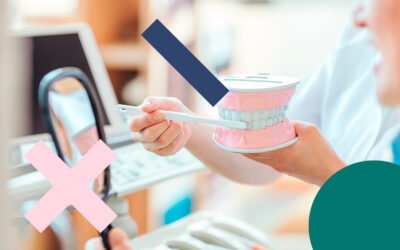Shere are many traits and characteristics that are inherited from parents to children. The transmission of certain genes plays a very important role in a person's physical appearance. However, recent studies have shown that dental that dental inheritance is another factor to be taken into account.
According to dental experts, there is a close relationship between genetics and dental health. There are There are certain predispositions to suffer from some oral diseaseswhich, when known, can be prevented.
While inherited pathologies or physical characteristics cannot be avoided in most cases, it is possible to their potential effects can be treated in advance.. Let's see how dental heredity influences the most common oral health problems.
What is dental inheritance?
Genetic inheritancedental ethics is the genetic information that determines the size, shape and genetic information that determines the size, shape and disposition of the teeth and that is transmitted from parents to children, giving the offspring a series of characteristics.The dental gene inheritance is something that can be beneficial for the offspring, but also a complex issue when dental inheritance is a matter of dental genetics. This is something that can be beneficial for children, but also a complex issue when dental inheritance involves certain oral health problems.
In the oral area there are some pathologies that are inherited within the family. Crooked teeth, malocclusion problems, cavities, and even a greater tendency to suffer periodontal disease are just some of them.
What is inherited from the parents cannot be modified, because it is part of the genetic material of each person. On the other hand, it is possible to find out about it in order to take early to act in time before the problems of dental inheritance become apparent..
How do genetics influence dental problems?
A person's dental heredity, that is, the physical characteristics he or she gets from his or her parents, can determine the size and shape of the teeth, the quality of the enamel, tissue malformations and the placement of the teeth. the size and shape of the teeth, the quality of the enamel, malformations in the tissues and placement of the teeth, and even supernumerary teeth or their absence.and even supernumerary teeth or the absence of these.
Caries and periodontal diseases are not inherited as such. What can affect children are the oral conditions they inherit from their parents. oral conditions that they inherit from their parents, causing a greater predisposition to suffer their consequences.causing a greater predisposition to suffer its consequences.
In addition to dental heredity, there are many other factors that can influence the health of your teeth and gums. Do you know why it is so important to visit the dentist at least once a year? In our blog we tell you all the details.
How do genetics determine whether or not to suffer from a dental problem?
Although it is a determining factor, genetic inheritance does not directly influence does not directly influence the development of dental problems such as caries or periodontitis. such as caries or periodontitis. There are many internal and external factors involved.
Therefore, maintaining good oral hygiene and good oral hygiene and meticulous care of the health of teeth and gums is particularly is especially essential for people who are more genetically predisposed.
At the other extreme we have the problems of dental crowding, diastasis, or oral malformations, which do have a direct genetic influence.
If there is a family history, the earlier children begin to visit the dentist, the better the chances of detecting and treating these disorders correctly. the greater the chances of detecting and treating these disorders correctly..
Dental problems that can be inherited
What are these conditioning factors that influence oral health and characteristics inherited from parents to children? As we have already mentioned, they are many and highly variable:
Periodontitis
Periodontitis is the inflammation of inflammation of the periodontal tissue due to infection caused by bacteria in the mouth. Good hygiene habits can prevent the gums from suffering these harmful effects, but also keep the tissue strong and healthy.
Those people with increased sensitivity of periodontal tissue should not neglect the hygiene and care of their gums so that such problems do not occur. Maintain a healthy mouth with daily care routines.
Discover our products for daily oral care

Enamel quality
Not everyone has the same thickness in the enamel layer that covers the teeth. This is a genetic genetic trait and, therefore, part of the dental inheritance that is transferred that is transferred within the family.
Some people are more prone to tooth decay because their enamel deteriorates more easily.What can be done in these cases? Very easy: keep the bacteria in the oral cavity at bay, preventing them from forming biofilm on the surface of the teeth, leading to tooth decay.
Composition of saliva
Saliva plays a very important role both in the digestive process and in the protection of the oral cavity. By maintaining a constant pH, saliva cleans the mouth and kills most of the bacteria responsible for caries. responsible for tooth decay.
In the same way, there are people whose saliva pH is different. A slightly more acidic or alkaline pH level may not do its job properly, favoring the proliferation of bacteria.
Orthodontic problems
Regarding dental inheritance, the most common problem detected at the dentist's office is the misalignment of teeth. Correcting the bite is not only done for esthetic reasons, but also to favor a good function of each of the teeth.but also to promote a good function of each of the teeth.
When there is a family history of any type of orthodontic problems, it is very important that children follow a progressive review, in order to act in time. It is easier to to correct the position of the teeth during childhood when the structures and tissues are growing.
The importance of inheriting good dental hygiene habits
The dental inheritance that passes from parents to children is not just a matter of genetics. From a young age, children look to their elders as the best example in terms of dental hygiene habits. dental hygiene habits.
It is very important that children learn from an early age to brush and take care of their teeth and gums, inheriting this healthy habit.inheriting this healthy habit. Parents, together with the dentist, are the main responsible for teaching the youngest of the house to prevent any type of discomfort or oral disease.
Dental health and dental heritage are two terms that go hand in hand. In all cases, prevention is the best solution. By taking care of the oral hygiene of the whole family and having regular check-ups at the dentist, it is much easier to have a more beautiful and healthier smile.


 What to consider when choosing the best electric toothbrush?
What to consider when choosing the best electric toothbrush? How to relieve pain with newly placed braces?
How to relieve pain with newly placed braces? How to keep your breath fresh?
How to keep your breath fresh?


